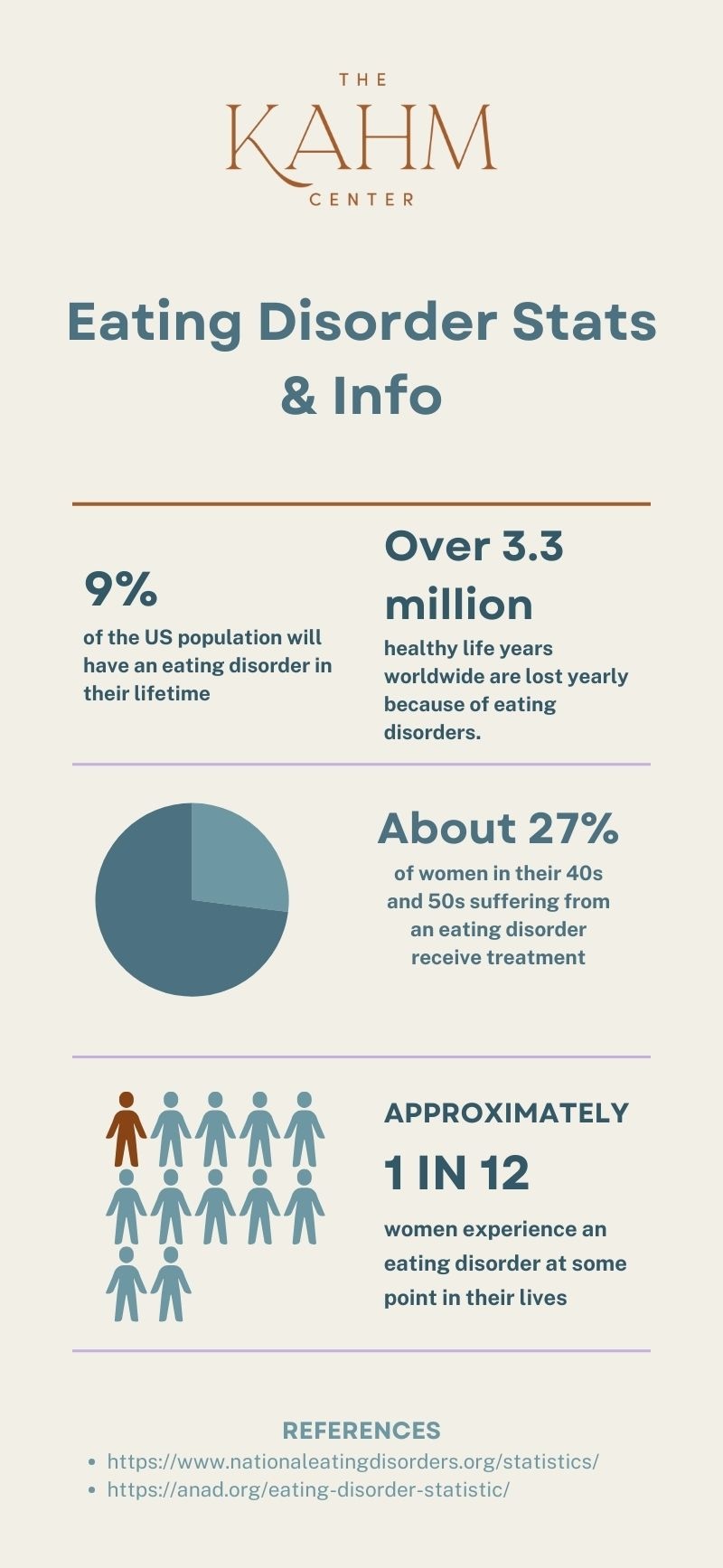
Finding the right treatment option can quickly become an additional mental and physical challenge if you or a loved one suffer from an eating disorder. Finding an option that works with your situation through a medical professional you trust is vital.
According to the National Association of Anorexia Nervosa and Associated Disorders, nearly 30 million Americans suffer from eating disorders like anorexia, bulimia nervosa, and binge eating disorder. While it is most common among females and adolescents, individuals of any gender and age group can be affected. The National Eating Disorder Association reports that eating disorders have the second-highest mortality rate of all mental health disorders, surpassed only by opioid addiction.
Partial hospitalization program (PHP) eating disorder treatment, otherwise known as day treatment, is offered at the Kahm Center for those struggling with eating disorders in Burlington, Vermont. We are a family owned and operated facility that provides individualized care dependent on client needs and diagnosis.

Short for Partial Hospitalization Program, PHP describes a treatment that allows patients to recover from their eating disorder under close medical supervision but without total disruption to everyday life. It combines the best of inpatient and outpatient recovery programs.
Patients who participate in a day treatment program spend five hours every working day undergoing treatment while being able to spend the rest of their week at home or work. They also have access to continuous support, weekly check-ins with specialized professionals like dietitians, and more.
Learn more about what is PHP for eating disorders by visiting our comprehensive page that delves deeper into what PHP is and what it entails.
Recovering from an eating disorder can rarely happen in isolation. Medical supervision is a vital component of ensuring there will be no relapses or adverse physical reactions that may require immediate attention. A partial hospitalization program offers that type of close supervision without completely disrupting the patient's life.
The PHP program for eating disorders typically includes a few essential components:
During day treatment, patients will be offered meals and snacks that align with their needs and medical recommendations. This guided nutritional program also plays a significant role in building a healthier, more sustainable life.
Depending on the patient's needs and medical history, partial hospitalization programs can differ significantly in duration. A longer and more intensive program may be necessary for more severe eating disorders or a history of mental health concerns. The goal is a full recovery without a chance of relapse.
Patients and their families can discuss their challenges with eating disorder professionals to determine if they meet the criteria for PHP. Some people may need more advanced therapy for the disorder and require residential treatment.


Partial hospitalization programs for eating disorders can treat all different subtypes of eating disorders. Individualized treatment can be created depending on diagnosis and type. Additional testing, like body composition analysis and metabolic testing, will be utilized to ensure each individual is on the path to recovery.
Eating disorders treated in day treatment can include:
Partial hospitalization is just one possible level of care among many. Cognitive behavioral therapy (CBT), dialectical behavioral theory (DBT), and family-based treatment (FBT) are some of the other therapies that are utilized during PHP.
Ultimately, medical professionals will recommend PHP treatment or other options based on your symptoms, medical and mental health history, current living situation, and other variables. That said, day treatment has a few important benefits to remember as you consider your recovery options.
Above all, PHP offers a treatment plan that is balanced between close supervision and continued flexibility. You can continue sleeping at home and potentially even attend work or school while still receiving that close supervision to help you improve.
Participation in a partial hospitalization program also means being able to participate in a more comprehensive treatment option. As mentioned above, PHP includes not just nutritional help and medical supervision but also various therapy and psychiatric help. This approach is vital to a comprehensive, sustainable recovery without relapse.
The result is a program in which patients with eating disorders can develop healthy eating habits and behaviors in a safe environment. At the same time, developing the skills needed to manage their eating disorder on a daily basis going forward.
To explore more about PHPs for eating disorders and the different levels of care, visit our comprehensive PHP vs. IOP for Eating Disorders page.
If someone you love is struggling with an eating disorder, understanding the best way to support them can be difficult. You want to help but aren't sure how to do so in a way that could damage your relationship or make the existing situation work.
As a first step, research eating disorders to understand your loved one's situation. In interaction with them, be sure to treat them in a way that makes clear that the eating disorder doesn't define them but is something they can work through with help and support from everyone around them. Avoid any blame or seeking for causes.
At the Kahm Center for Eating Disorders, our treatment team consists of experienced clinicians, nutritionists, and healthcare providers who work together to create an individualized treatment plan. This team approach ensures that all aspects of the patient's well-being are addressed, from physical health to mental and emotional support.
Most importantly, the treatment options should be deferred to medical professionals like the Kahm Center for Eating Disorders. This crucial step ensures that your loved one will get the guidance they need, from nutritional information to mental health support designed to prevent relapses and lead to a healthier lifestyle.
For patients transitioning from a PHP, step-down programs and intensive outpatient programs (IOP) are available. These programs offer continued support and treatment while allowing patients to gradually resume their daily lives. Outpatient care provides the necessary support groups and coping skills training to help patients maintain their recovery.
Family Therapy: Involves caregivers and family members in the recovery process to provide support and understanding.
Medication Management: Ensures that any medications prescribed are taken correctly and effectively.
Nutritional Counseling: Provides patients with the knowledge and skills to make healthier food choices and develop a balanced diet.
Supportive Environment: A safe and nurturing space where patients can focus on their recovery without external pressures.
By integrating these various components, the Kahm Center for Eating Disorders offers a comprehensive and holistic approach to eating disorder recovery, helping patients achieve lasting health and well-being.

Nick Kahm, a former philosophy faculty member at St. Michael's College in Colchester, VT, transitioned from academia to running the Kahm Clinic with his mother. He started the clinic to train dietitians in using Metabolic Testing and Body Composition Analysis for helping people with eating disorders. Now, he is enthusiastic about expanding eating disorder treatment through the Kahm Center for Eating Disorders in Vermont.